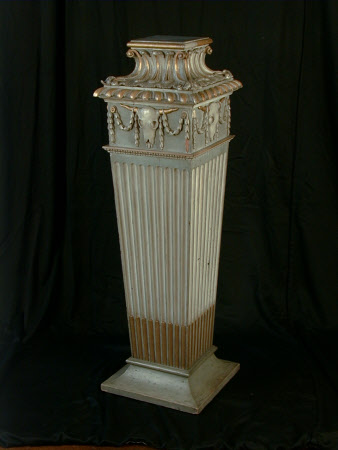Pedestal stand
manner of Robert Adam (Kirkcaldy 1728 - London 1792)
Category
Furniture
Date
circa 1785
Materials
Paint and parcel gilt deal
Measurements
105.5 x 32 x 32 cm
Place of origin
London
Order this imageCollection
Dyrham, Gloucestershire
NT 453029.2
Summary
One of a pair of monochrome painted and parcel gilt pedestal stands or torchères, in the manner of Robert Adam (1728–92) London, circa 1785 The square top with applied moulded edge and waisted scroll carved collar raised on a square section, stop fluted, tapered column headed on all four sides with a gadroon carved edge and panel with carved ox sculls with husk swags, terminating on a waisted plinth base.
Full description
Robert Adam (1728–92) was one of the most important British architects working in the Neo-classical style. He was a main force in the development of a unified style that extended beyond architecture and interiors to include both the fixed and moveable objects in a room. He incorporated design ideas from ancient Greece and Rome into his forms and decoration. His commissions include Kenwood House, Osterley Park and Syon House. Born in Kirkaldy, Scotland, Robert Adam was the son of the established architect William Adam, and followed him into the family practice. In 1754 he embarked on a ‘Grand Tour’, spending five years in France and Italy visiting classical sites and studying architecture. On his return Adam established his own practice in London with his brother James. Although classical architecture was already becoming popular, Adam developed his own style, which was influenced by classical design but did not follow Roman architectural rules as strictly as Palladianism did. There are various similarities in decoration incorporated in the pair of pedestals that can be compared to Adam's designs; the square tapered fluted form, the applied husk swags and the Ox skull ornament are all characteristics of his work. James Weedon (December 2017)
Provenance
Indigenous collection purchased by the Ministry of Works in 1956 and given to Dyrham Park in 1961
Makers and roles
manner of Robert Adam (Kirkcaldy 1728 - London 1792), architect manner of Robert Adam (Kirkcaldy 1728 - London 1792), designer
